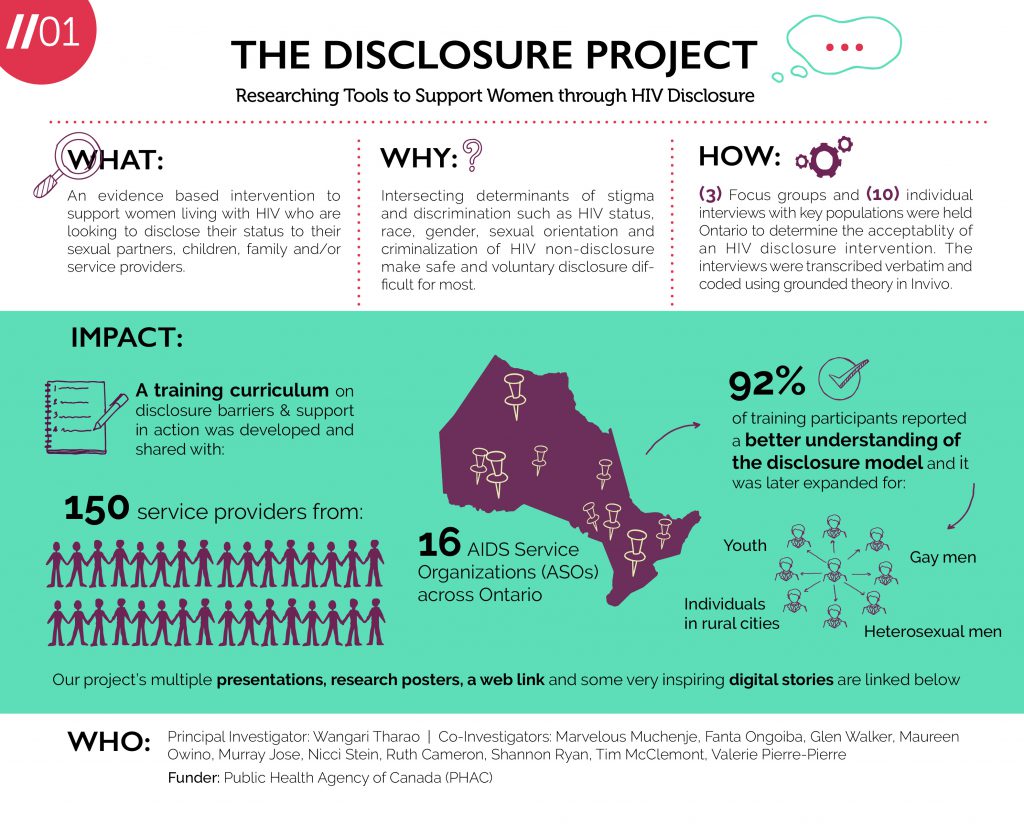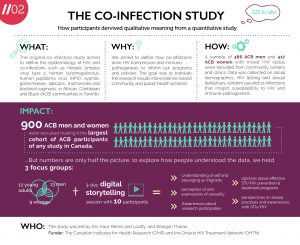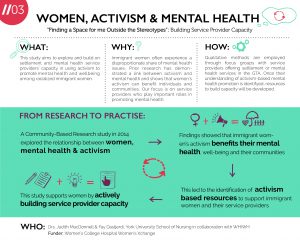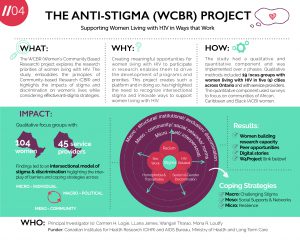- To generate knowledge that improves the lives and health of racialized women
- To equip our programs, services and strategic vision with evidence
- To influence policy and practice
- To foster learning relationships between researchers, policy makers, service providers, service users and our communities
Over the last 15 years our small research team led by Wangari Tharao has published 25 peer reviewed journal articles, four book chapters and 11 technical reports on wise practices spanning over 35 research projects. Numerous academic and community presentations have also been delivered in local and global forums.
This cumulative sharing of knowledge has impacted the ways in which policymakers make policy, the way service providers produce and deliver services and most importantly, the way women approach their health. WHIWHs has used its research data to advocate for the recognition of social determinants of health, health services for the uninsured and the removal of sexist and/or racist health practices.
Here are some research studies with significant community impacts:
01. Tools to Support Women through HIV Disclosure (HIV Disclosure Project)
This study enabled us to develop and pilot test an evidence based disclosure intervention to support women living with HIV to disclose their status. If women are looking for supports in disclosure to sexual partners, children, family and/or service providers, this tool can be a good place to start.
Existing literature indicates that intersecting facets of stigma and discrimination such as HIV status, race, gender, sexual orientation, etc., make it particularly difficult to find resources and opportunities for voluntary and safe disclosure. This is further complicated by the criminalization of HIV non-disclosure in Canada. Given these challenges and over the course of our collaborative work, the Disclosure Project has had considerable impact.
Highlights & Impacts:
- A training curriculum was developed for service providers covering disclosure barriers and support in action and was delivered to 150 participants at AIDS Service Organizations across Ontario
- 92% of training participants who participated in the HIV Disclosure Training reported that they had a better understanding of how to implement the HIV disclosure model as a whole.
- The intervention was later expanded to reflect the needs of youth, heterosexual men, gay men, and individuals living in rural cities; due to many people living with HIV identifying disclosure of their HIV status to sexual partners, children, service providers, and families as a major and ongoing challenge
- Adopted by the Canadian Aboriginal AIDS Network (CAAN)
Details:
Funder: Public Health Agency of Canada (PHAC)
Principal Investigator: Wangari Tharao
Co-Investigators: Marvelous Muchenje, Fanta Ongoiba, Glen Walker, Maureen Owino, Murray Jose, Nicci Stein, Ruth Cameron, Shannon Ryan, Tim McClemont, Valerie Pierre-Pierre
Advisory Committee:
Peers:
02. How Co-Infections affect HIV Transmission
This study explores the role of common co-infections in HIV susceptibility, immune-pathogenesis and secondary transmission.
secondary transmission.
We aim to define the community epidemiology of HIV and co-infections such as Herpes simplex virus type 2 (HSV2), human cytomegalovirus (CMV), human papilloma virus (HPV), syphilis, N. gonorrhea (Ng), C. albicans, C. trachomatis and bacterial vaginosis (BV) in Black women, men and gay men in Toronto and to define how these co-infections drive HIV transmission and immuno-pathogenesis, and to translate these results into community and public health action(s).
Highlights & Impacts:
Details:
Funder: CIHR Emerging Team Grants
Principal Investigator (s): Drs. Rupert Kaul, Robert Remis, Scott D. Gray-Owen,
Charu Kaushic, Kelly S. Macdonald.
Co-Investigator (s): Wangari Tharao, Mona Loutfy, Megan Saunders
Advisory Committee:
Peers:
03. What does Activism look like for Immigrant Women and what does this mean for Mental Health?
Immigrant women often experience a disproportionate share of mental health concerns and mental illness, yet there is limited understanding of strategies to foster their mental health.
illness, yet there is limited understanding of strategies to foster their mental health.
This participatory policy study explores the relationship between immigrant women’s activism and mental health promotion. It explores how immigrant women themselves express their agency and describe their political activism and the meanings it has for them in relation to the settlement process. In this way we attempt to offer insights on the largely unexplored research question in Canada of how immigrant women conceptualize activism.
Highlights & Impacts:
- To share our findings with women in our communities, service providers, researchers and policymakers, we held a research forum and engaged in collective discussion for how to use this data to further policy and practice.
Details:
Research Partner: York University
Principal Investigator (s):
Co-Investigator (s):
Advisory Committee:
Peers:
04. Supporting HIV-Positive Women in Ways that Work
We are invested in learning about new and innovative ways to support women living with HIV. This  study evaluates the applicability of the wHEALTH intervention in a web-based format. Our original wHEALTH intervention was delivered in-person and we wanted to compare how effective and acceptable an online version of this model would be.
study evaluates the applicability of the wHEALTH intervention in a web-based format. Our original wHEALTH intervention was delivered in-person and we wanted to compare how effective and acceptable an online version of this model would be.
This study also allows us to enhance our understanding of HIV-related stigma as a barrier to women living with HIV to seeking social support. This knowledge enables us to match Peer Case Managers and participants during the intervention.
Highlights & Impacts:
Details:
Funder: OHTN
Principal Investigator (s): Adriana Carvalhal; Shari Margolese; Wangari Tharao
Co-Investigator (s): Allyson Ion; Esther Guzha; Mary Mwalwanda; Marvelous Muchenje; Saara Greene
Advisory Committee:
Peers:



